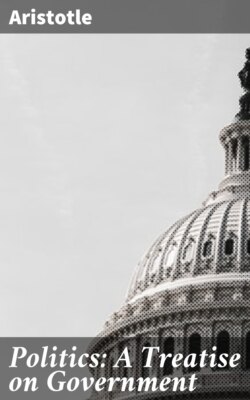Читать книгу Politics: A Treatise on Government - Aristotle - Страница 27
На сайте Литреса книга снята с продажи.
CHAPTER IV
ОглавлениеTable of Contents
Besides, those who contrive this plan of community cannot easily avoid the following evils; namely, blows, murders involuntary or voluntary, quarrels, and reproaches, all which it would be impious indeed to be guilty of towards our fathers and mothers, or those who are nearly related to us; though not to those who are not connected to us by any tie of affinity: and certainly these mischiefs must necessarily happen oftener amongst those who do not know how they are connected to each other than those who do; and when they do happen, if it is among the first of these, they admit of a legal expiation, but amongst the latter that cannot be done. It is also absurd for those who promote a community of children to forbid those who love each other from indulging themselves in the last excesses of that passion, while they do not restrain them from the passion itself, or those intercourses which are of all things most improper, between a Father and a son, a brother and a brother, and indeed the thing itself is most absurd. It is also ridiculous to prevent this intercourse between the nearest relations, for no other reason than the violence of the pleasure, while they think that the relation of father and daughter, the brother and sister, is of no consequence at all. It seems also more advantageous for the state, that the husbandmen should have their wives and children in common than the military, for there will be less affection [1262b] among them in that case than when otherwise; for such persons ought to be under subjection, that they may obey the laws, and not seek after innovations. Upon the whole, the consequences of such a law as this would be directly contrary to those things which good laws ought to establish, and which Socrates endeavoured to establish by his regulations concerning women and children: for we think that friendship is the greatest good which can happen to any city, as nothing so much prevents seditions: and amity in a city is what Socrates commends above all things, which appears to be, as indeed he says, the effect of friendship; as we learn from Aristophanes in the Erotics, who says, that those who love one another from the excess of that passion, desire to breathe the same soul, and from being two to be blended into one: from whence it would necessarily follow, that both or one of them must be destroyed. But now in a city which admits of this community, the tie of friendship must, from that very cause, be extremely weak, when no father can say, this is my son; or son, this is my father; for as a very little of what is sweet, being mixed with a great deal of water is imperceptible after the mixture, so must all family connections, and the names they go by, be necessarily disregarded in such a community, it being then by no means necessary that the father should have any regard for him he called a son, or the brothers for those they call brothers. There are two things which principally inspire mankind with care and love of their offspring, knowing it is their own, and what ought to be the object of their affection, neither of which can take place in this sort of community. As for exchanging the children of the artificers and husbandmen with those of the military, and theirs reciprocally with these, it will occasion great confusion in whatever manner it shall be done; for of necessity, those who carry the children must know from whom they took and to whom they gave them; and by this means those evils which I have already mentioned will necessarily be the more likely to happen, as blows, incestuous love, murders, and the like; for those who are given from their own parents to other citizens, the military, for instance, will not call them brothers, sons, fathers, or mothers. The same thing would happen to those of the military who were placed among the other citizens; so that by this means every one would be in fear how to act in consequence of consanguinity. And thus let us determine concerning a community of wives and children.
